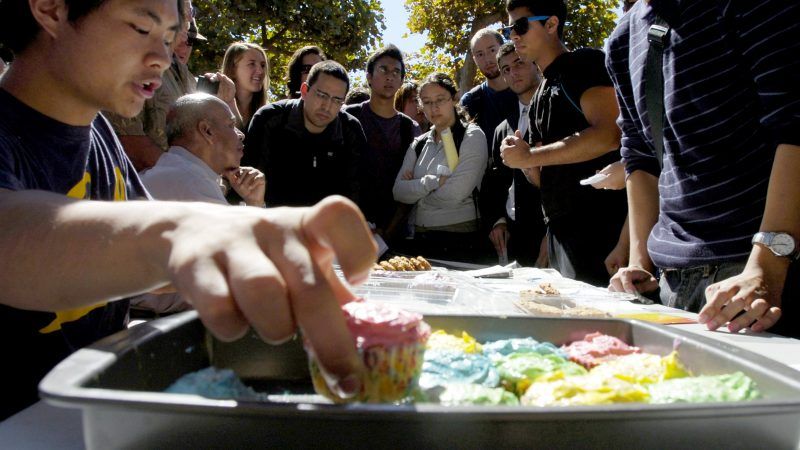College Campus Food Policy Restricts Bake Sale Fundraisers
Campus food police are making inroads all over America

Last month, it was reported that the State University of New York at Binghamton (often referred to as Binghamton University or SUNY Binghamton) implemented its first schoolwide food policy. According to the B.U. Pipe Dream, a student paper, the policy, which was developed with input from student groups and university officials and put in place before students returned for the fall semester, is intended "to guarantee that food on campus will be served safely."
At first glance, that sounds fine. Good, even. But the devil is in the details.
The Pipe Dream reported that the policy "requires student organizations tabling on campus to only offer pre-packaged and low-risk food items." The policy also covers both food that's to be sold and food given away free of charge. Penalties for violations of the food policy can be severe, and may "include[e] suspension or expulsion from the University."
Supporters had predicted the policy would go almost unnoticed. But student groups on campus that rely on bake sales to raise money are now complaining loudly that they've been forced "to react and rethink their fundraising options."
"We are celebrating our 50th year, and this year was pivotal for us because we wanted to do a lot more in terms of fundraising," Jahmal Ojeda, president of the Latin American Student Union, told the Pipe Dream earlier this month. "I feel like this new food policy is setting us back."
What problem or problems, if any, was the new policy intended to address?
"[S]tudents had no reference as to what they can and can't prepare on campus for others," senior Paul Zakrepine, co-president of the Student Culinary Council, told the Pipe Dream. "This, in turn, led to unsafe food-handling practices that put others at risk for contracting a foodborne illness."
The new policy, which actually appears to focus far more on who handles food than it does on how food is handled, does include some exceptions. But they don't exactly swallow the rule.
For a student group to obtain a waiver to sell some cookies on campus requires a willingness on the part of students to wade through a good deal of red tape.
"[We're] known for our fried Oreo sales, which we sell when we table," Alexa Macleod, a senior and member of a multicultural group on campus, told the Pipe Dream. "Instead, now we are doing a raffle, which will try to supplement not being able to do these Oreo sales anymore. We are going to try to do a waiver."
If her group can't obtain that waiver, Macleod tells the paper they will be forced to sell prepackaged food instead—a prospect that doesn't make her enthusiastic. "I'm not going to buy a bag of chips on campus if I could just buy a bag of chips at the grocery store," Macleod says.
A university official defends the move.
"The new policy may be causing campus groups to think differently about fundraising opportunities, which could result in favorable outcomes for groups," Deanne Ellison, director of Auxiliary Services, told me this week. "What you refer to as a 'controversy,' I would consider healthy and constructive channels of communication."
To be fair, Binghamton University's school food policy doesn't appear to be an extreme outlier. For example, Michigan Tech's food policy mandates that "only food prepared by the Memorial Union or Residential Services shall be permitted to be distributed or sold on campus." The University of Kansas's food policy declares that all "food/snacks sold or given away on campus must be obtained through and/or prepared by KU Dining Services, the University's licensed, health-inspected facilities[,] or by the licensed caterers and concessionaires contracted by Kansas Athletics." The KU policy also goes into tedious detail over the types of potluck meals that may be served on campus.
Still, the debate over Binghamton University's food policy illustrates a larger point I've made many times: food safety rules are often at odds with food choices—particularly locally produced ones.
As I detailed in a 2015 column, advocates for locally produced food and advocates for stricter food safety regulations may appear from afar to be playing together happily in the same sandbox. But a closer look reveals they're really fighting over what to do with the same toy.
"Disconnect between staunch supporters of rigid, process-oriented food safety regulations and advocates for local food is palpable," I wrote. "Their goals are simply at loggerheads."
The local-food advocates are the ones who stop at kids' lemonade stands. The food-safety fanatics are the ones who want to shut them down. (My recent book, Biting the Hands that Feed Us: How Fewer, Smarter Laws Would Make Our Food System More Sustainable, is chock full of examples like these.)
Ultimately, the Binghamton University policy doesn't ban any student group from selling homemade food at a bake sale on campus. Rather, it bans some foods and discourages students from selling any homemade foods at all by erecting a series of irritating and time-sensitive hoops through which students must jump before they may do so.
Last year, the Binghamton University Food Sustainability Group, a student group at the university, hosted a vegan buffet around the Thanksgiving holiday. Will that group be able to hold that same meal celebration this year? I reached out to the group through its Facebook page this week but did not hear back. They're busy at work, I suspect, on a waiver request.

Show Comments (67)